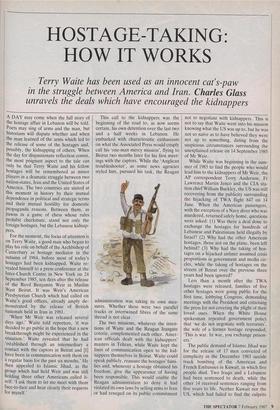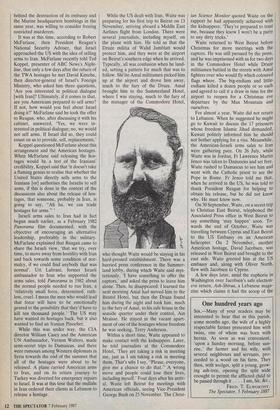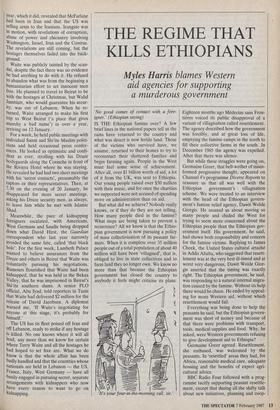HOSTAGE-TAKING: HOW IT WORKS
Terry Waite has been used as an innocent cat's-paw
in the struggle between America and Iran. Charles Glass
unravels the deals which have encouraged the kidnappers
A DAY may come when the full story of the hostage affair in Lebanon will be told. Poets may sing of arms and the man, but historians will dispute whether and when the man learned of the arms which led to the release of some of the hostages and, possibly, the kidnapping of others. When the day for dispassionate reflection comes, the most poignant aspect to the tale can only be that Terry Waite and his fellow hostages will be remembered as minor players in a dramatic struggle between two nation-states, Iran and the United States of America. The two countries are united at this moment in history by their mutual dependence in political and strategic terms and their mutual hostility for domestic propaganda reasons. Between them, as pawns in a game of chess whose rules prohibit checkmate, stand not only the foreign hostages, but the Lebanese kidnap- pers.
For the moment, the focus of attention is on Terry Waite, a good man who began to play his role on behalf of the Archbishop of Canterbury as hostage mediator in the autumn of 1984, before most of today's hostages had been kidnapped. Waite re- vealed himself to a press conference at the Inter-Church Centre in New York on 24 September 1985, ten days after the release of the Revd Benjamin Weir in Muslim West Beirut. It was Weir's American Presbyterian Church which had called on Waite's good offices, already amply de- monstrated by the release of British nationals held in Iran in 1981.
'When Mr Weir was released several days ago,' Waite told reporters, 'it was decided to go public in the hope that a new breakthrough might be experienced in the situation.' Waite revealed that he had `established through an intermediary a contact with the captors in Beirut and [I] have been in communication with them on a regular basis for the past six months.' He then appealed to Islamic Jihad, as the group which had held Weir and was still holding three other Americans called it- self: 'I ask them to let me meet with them face-to-face and hear clearly their requests for myself.' This call to the kidnappers was the beginning of the road to, as now seems certain, his own detention over the last two and a half weeks in Lebanon. He embarked with characteristic enthusiasm on what the Associated Press would crisply call his 'one-man mercy mission', flying to Beirut two months later for his first meet- ings with the captors. While the 'Anglican troubleshooter', as some news agencies styled him, pursued his task, the Reagan administration was taking its own mea- sures. Whether these were two parallel tracks or intertwined fibres of the same thread is not clear.
The two missions, whatever the inten- tions of Waite and the Reagan Irangate coterie, complemented each other. Amer- ican officials dealt with the kidnappers' masters in Tehran, while Waite kept the lines of communication open to the kid- nappers themselves in Beirut. Waite could speak publicly, reassure the hostages' fami- lies and, whenever a hostage obtained his freedom, give the appearance of having been responsible. This would enable the Reagan administration to deny it had violated its own laws by selling arms to Iran or had reneged on its public commitment not to negotiate with kidnappers. This is not to say that Waite went into his mission knowing what the US was up to, but he was not so naïve as to have believed they were not up to something, dating from the suspicious circumstances surrounding the unexplained release on 14 September 1985 of Mr Weir.
While Waite was beginning in the sum- mer of 1985 to find the people who would lead him to the kidnappers of Mr Weir, the AP correspondent Terry Anderson, Fr Lawrence Martin Jenco and the CIA sta- tion chief William Buckley, the US was still recovering from the publicity surrounding the hijacking of TWA flight 847 on 14 June. When the American passengers, with the exception of a Navy diver who was murdered, returned safely home, questions were asked: (1) Was there a deal done to exchange the hostages for hundreds of Lebanese and Palestinians held illegally by Israel? (2) Why had the other American hostages, those not on the plane, been left behind? (3) Why had the taking of hos- tages on a hijacked airliner assumed crisis proportions in government and media cir- cles, while the taking of hostages on the streets of Beirut over the previous three years had been ignored?
Less than a month after the TWA hostages were released, families of five other hostages were going public for the first time, lobbying Congress, demanding meetings with the President and criticising the press for not covering the plight of their loved ones. When the White House spokesman repeated government policy that 'we do not negotiate with terrorists', the wife of a former hostage responded, `This is war. In war, you exchange prison- ers.'
The public demand of Islamic Jihad was for the release of 17 men convicted of complicity in the December 1983 suicide truck bombing of the American and French Embassies in Kuwait, in which five people died. Two Iraqis and a Lebanese had been sentenced to death, while the other 14 received sentences ranging from five years to life. Neither Kuwait nor the US, which had failed to find the culprits behind the destruction of its embassy and the Marine headquarters bombings in the same year, was willing to consider freeing convicted murderers.
It was at this time, according to Robert McFarlane, then President Reagan's National Security Adviser, that Israel approached the US with the idea of selling arms to Iran. McFarlane recently told Ted Koppel, presenter of ABC News's Night- line, that only a few days after the return of the TWA hostages he met David Kimche, then director-general of Israel's Foreign Ministry, who asked him three questions, `Are you interested in political dialogue [with Iran]? Ultimately, if it comes to that, are you Americans prepared to sell arms? If not, how would you feel about Israel doing it?' McFarlane said he took the offer to Reagan, who, after discussing it with his cabinet, answered, 'Yes, we were in- terested in political dialogue; no, we would not sell arms. If Israel did so, they could count on us to provide, sell, replacements.'
Koppel questioned McFarlane about this arrangement and the American hostages. When McFarlane said releasing the hos- tages would be a test of the Iranians' credibility, Koppel said that 'it doesn't take a flaming genius to realise that whether the United States directly sells arms to the Iranians [or] authorises the Israelis to sell arms, if this is done in the context of the discussions also about the release of hos- tages, that someone, probably in Iran, is going to say, "Ah ha, we can trade hostages for arms." ' Israeli arms sales to Iran had in fact begun much earlier, as a February 1982 Panorama film documented, with the objective of encouraging an alternative leadership, preferably in the military. McFarlane explained that Reagan came to share the Israeli view, 'that we try, over time, to move away from hostility with Iran and back towards some condition of nor- malcy, if we could find anybody that was normal'. Uri Lubrani, former Israeli ambassador to Iran who supported the arms sales, told Panorama in 1982 about the normal people needed to run Iran, a `relatively small force, determined, ruth- less, cruel. I mean the men who would lead that force will have to be emotionally geared to the possibility that they'd have to kill ten thousand people.' The US may have wanted its hostages back, but it also wanted to find an Iranian Pinochet.
While this was under way, the CIA director William Casey and the American UN Ambassador, Vernon Walters, made semi-secret trips to Damascus, and there were rumours among Western diplomats in Syria towards the end of the summer that all of the hostages were about to be released. A plane carried American arms to Iran, and on its return journey to Turkey was diverted for emergency repairs to Israel. It was at this time that the mullahs in Iran ordered their clients in Lebanon to release a hostage. While the US dealt with Iran, Waite was preparing for his first trip to Beirut on 13 November, arriving aboard a Middle East Airlines flight from London. There were several journalists, including myself, on the plane with him. He told us that the Druze militia of Walid Jumblatt would protect him, and they were at the airport on Beirut's southern edge when he arrived. Typically, all was confusion when he land- ed, setting a pattern for much that was to follow. Shi'ite Amal militiamen picked him up at the airport and drove him away, much to the fury of the Druze. Amal brought him to the Summerland Hotel, where I was staying, much to the fury of the manager of the Commodore Hotel, who thought Waite would be staying in his hard-pressed establishment. There was a hurried press conference in the Summer- land lobby, during which Waite said mys- teriously, 'I have something to offer the captors,' and asked the press to leave him alone. Then, he disappeared. I learned the next morning Amal had moved him to the Bristol Hotel, but then the Druze found him during the night and took him, much to the fury of Amal, to his safe house in the seaside quarter under their control, Ain Mraisse. He stayed in the vacant apart- ment of one of the hostages whose freedom he was seeking, Terry Anderson.
Within a short time, Waite appeared to make contact with the kidnappers. Later, he told journalists at the Commodore Hotel, 'They are taking a risk in meeting me, just as I am taking a risk in meeting them. That's why I say, "Please, everyone, give me a chance to do that." A wrong move and people could lose their lives, including myself.' Four days after his arriv- al, Waite left Beirut for meetings with American officials, seeing Vice-President George Bush on 25 November. The Christ- ian Science Monitor quoted Waite on the rapport he had apparently achieved with the kidnappers: 'They're prepared to trust me, because they know I won't be a party to any dirty tricks.'
Waite returned to West Beirut before Christmas for more meetings with the captors. He was still pursued by the press, and he was imprisoned with us for two days in the Commodore Hotel while Druze militiamen battled in the streets with Amal fighters over who would fly which coloured flags where. The big-endians and little- endians killed a dozen people or so each and agreed to call it a draw in time for the airport to reopen for a Christmas eve departure by the Man Mountain and ourselves.
For almost a year, Waite did not return to Lebanon. When he suggested he might go to Kuwait to discuss the 17 prisoners whose freedom Islamic Jihad demanded, Kuwait politely informed him he should not bother applying for a visa. Meanwhile, the American-Israeli arms sales to Iran were gathering pace. On 26 July, while Waite was in Jordan, Fr Lawrence Martin Jenco was taken to Damascus and set free. Waite rushed to Damascus to see him and went with the Catholic priest to see the Pope in Rome. Fr Jenco told me that, when he arrived in the US, he was told to thank President Reagan for helping to obtain his release, but he did not know why. He must know now.
On 30 September, Waite, on a secret trip to Christian East Beirut, telephoned the Associated Press office in West Beirut to say something 'may happen' soon. To- wards the end of October, Waite was travelling between Cyprus and East Beirut to the US Embassy on an American helicopter. On 2 November, another American hostage, David Jacobsen, was released in West Beirut and brought to the east side. Waite greeted him at the US embassy and, along with Oliver North, flew with Jacobsen to Cyprus.
A few days later, amid the euphoria in Washington over Jacobsen's safe election- eve return, Ash-Shiraa, a Lebanese maga- zine which claims it had the scoop of the Year, which it did, revealed that McFarlane had been in Iran and that the US was selling arms to the Iranians. Irangate was in motion, with revelations of corruption, abuse of power and chicanery involving Washington, Israel, Iran and the Contras. The revelations are still coming, but the hostages themselves faded into the back- ground.
Waite was publicly tainted by the scan- dal, despite the fact there was no evidence he had anything to do with it. He refused to abandon what was from the beginning a humanitarian effort to set innocent men free. He planned to travel to Beirut to be with the hostages at Christmas, but Walid Jumblatt, who would guarantee his secur- ity, was out of Lebanon. When he re- turned, Waite arranged to make his first trip to West Beirut Ca place that gives anarchy a bad name') in over a year, arriving on 12 January.
For a week, he held public meetings with individual Sunni and Shi'ite Muslim politi- cians and held occasional press confer- ences. He looked as optimistic and confi- dent as ever, strolling with his Druze bodyguards along the Corniche in front of the Riviera Hotel where he was staying. He revealed he had had two short meetings with his 'secret contacts', presumably the captors or their representatives. Then, at 7.30 on the evening of 20 January, he disappeared for more secret meetings, asking his Druze security men, as always, to leave him while he met with Islamic Jihad.
Meanwhile, the pace of kidnapping foreigners escalated, with Americans, West Germans and Saudis being dropped down what David Hirst, the Guardian correspondent who last year narrowly avoided the same fate, called 'that black hole'. For the first week, Lambeth Palace wanted to believe assurances from the Druze and others in Beirut that Waite was voluntarily pursuing his negotiations. Rumours flourished that Waite had been kidnapped, that he was held in the Bekaa Valley, that he was imprisoned in Beirut's Shi'ite southern slums. A senior PLO official, Abu lyad, told reporters in Tunis that Waite had delivered $2 million for the release of David Jacobsen. A diplomat warned me, 'If Waite's negotiating for anyone at this stage, it's probably for himself.'
The US has its fleet poised off Iran and off Lebanon, ready to strike if any hostage is killed. No one knows where it will all lead, any more than we know for certain Where Terry Waite and all the hostages he had hoped to set free are. What we do know is that the whole affair has been badly handled and that the countries whose nationals are held in Lebanon — the US, France, Italy, West Germany — have all busily engaged in pursuing secret, separate arrangements with kidnappers who now have every reason to want to go on kidnapping.




















































 Previous page
Previous page